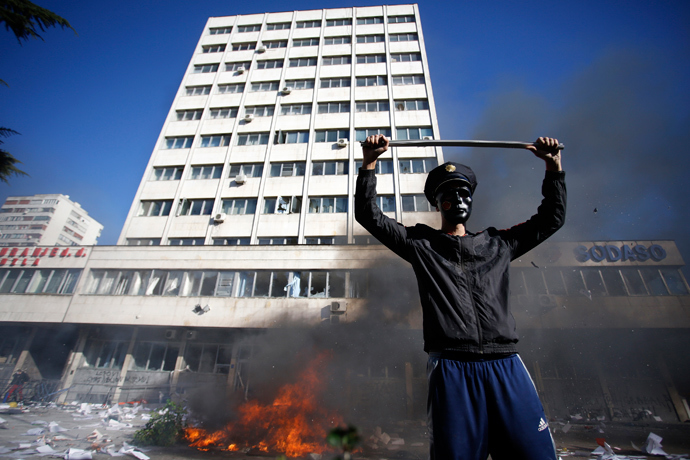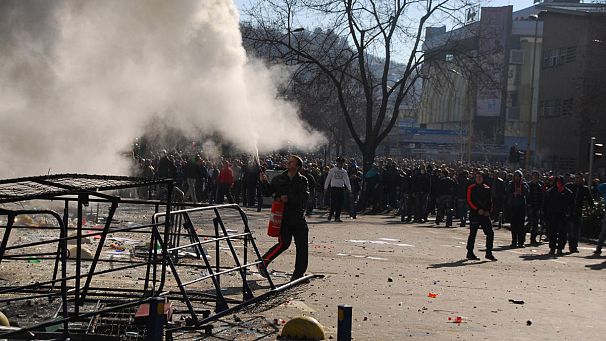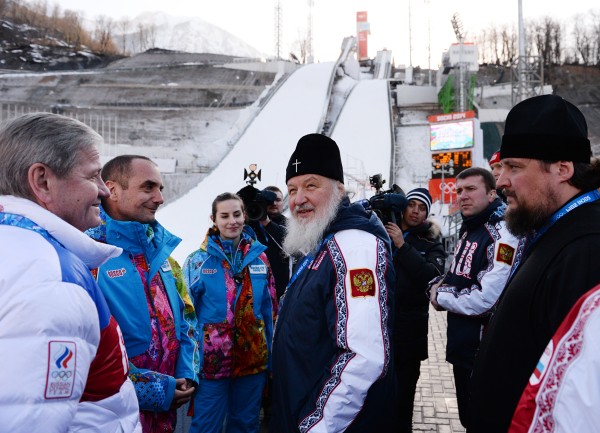Violent protests across Bosnia injure 150, as people demand govt. overhaul
"I think this is a genuine Bosnian spring. We have nothing to
lose. There will be more and more of us in the streets, there are
around 550,000 unemployed people in Bosnia," as Reuters was
told by Almir Arnaut, an unemployed economist and activist from
Tuzla. Another, a construction worker, told AFP that “people
are hungry.”
Published time: February 07, 2014 13:07
Edited time: February 08, 2014 12:55

Protesters stand near a fire set in front of a government building in Tuzla February 7, 2014. (Reuters / Dado Ruvic)
At least 150 people were injured, as protesters
across the former Yugoslav republic of Bosnia rebel against corruption,
joblessness and political stagnation. Scuffles have reached the
presidential residency, resulting in the use of water cannon.
Several major cities in the Balkan state are gripped by dissent,
which started as a local unemployment rally and grew into a
nationwide protest – the worst outburst of violence since the
regional war ended back in 1995.
The unrest that blew up in the capital, Sarajevo, on Wednesday
had quickly evolved by Friday into violent scuffles with law
enforcement, and the setting of government buildings on fire.
There were at least 105 injured by the end of the week, as police
launched stun grenades and rubber bullets at angry egg and
stone-throwing demonstrators.
With one in five people in the country living below the poverty
line (by Reuters’ estimates), the numbers that took to the
streets were great. Eyewitnesses reported on Friday that as many
as 6,000 people were on the streets of the capital Sarajevo,
which has a population of about 527,000. Two cars and a police
cabin were set on fire, as the raging crowd was pushed back from
the government residency with water cannon.
Tear gas and rubber bullets were also used in the course of those
several days.

Protesters burn documents from a government building in Tuzla February 7, 2014 (Reuters / Dado Ruvic)
In the town of Zenica, rioters successfully set fire to another
government building, chanting "Revolution!" and "Thieves!" Around
3,000 people were on the streets, leaving a total of 55 people
injured, 23 of them police officers, AFP reported.
But the most violent clashes are occurring in the northern city
of Tuzla, where, as of Friday 11 more people were injured,
following Thursday’s 130 people – mostly police. Factory closures
led to a quick surge in anti-government sentiment.
Another government building was set on fire, as several officials
were seen escaping through the windows. The city is also
suffering looting, with people emerging from municipal buildings
and escaping with computers. There have also been attacks on
supermarkets.
"I think this is a genuine Bosnian spring. We have nothing to
lose. There will be more and more of us in the streets, there are
around 550,000 unemployed people in Bosnia," as Reuters was
told by Almir Arnaut, an unemployed economist and activist from
Tuzla. Another, a construction worker, told AFP that
“people
are hungry.”
The rapidly escalating situation has led to the chiefs of the
regional Tuzla and Zenica government resigning. The chaos is
unprecedented, given the common view that Serbs, Bosnians and
Croats would rather risk political stagnation than ever returning
to the kind of violence they saw during the Bosnian War of
1992-95.
"This is so sad,” a woman standing by a burning
government said.
"It took four years of war to destroy it and
vandals now burned it in one day. This is just as in 1992."

Protesters throw rocks at a government building in Tuzla February 7, 2014 (Reuters / Dado Ruvic)
Zenica, Bihac and Mostar are some of the other population centers
that have witnessed clashes. However, peaceful rallies also
occurred in support of unity among Bosnia’s ethnicities. In the
Bosnian-Serb city of Banja Luka, 300 peaceful citizens came out
to do just that.
"We are all citizens of Bosnia and we all have the same
difficult lives here," Aleksandar Zolja, organizer and
president of the non-governmental organization Helsinki Citizens'
Assembly, said at the rally.
Some in Serbia's capital also stood in solidarity with the
Bosnians.
The demonstrations began on Wednesday, the tipping point being
controversial privatizations of key local industries, which since
2000 have resulted in eventual bankruptcies, leaving much of the
working population unemployed.
Bosnia is now considered the poorest country in the whole of the
former Yugoslavia.

A protester stands near a fire set in front of a government building in Tuzla February 7, 2014. (Reuters / Dado Ruvic)
But as protests have spread, so the demands have broadened. The
demonstrators are now asking not just for better economic
conditions, but for an overhaul of the political system. This has
led to a televised address by the Bosnian tripartite government
presidency’s chairman, Zeljko Komsic. He asks for peace, while
taking the blame as politician.
"We are responsible for everything... Nothing good will come
from anarchy," he appealed to the country, promising to hold
an emergency meeting of the leadership. Prime Minister Nermin
Niksic, who held the meeting on Thursday, has recognized the
validity of the protesters’ complaints, but implored them to
refrain from violence.
According to non-profit Transparency International, Bosnians
experience more corruption than any other Balkan state.
A presidential election is scheduled for October.
 />
/>






















 A
ferry is docked at the damaged port after an earthquake in Lixouri on
the island of Kefalonia, western Greece on Monday, Feb. 3, 2014. (AP
Photo)
A
ferry is docked at the damaged port after an earthquake in Lixouri on
the island of Kefalonia, western Greece on Monday, Feb. 3, 2014. (AP
Photo)






